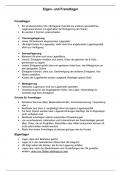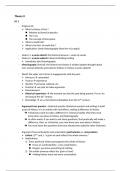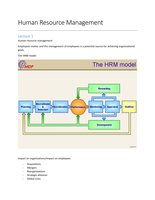person’s reputation)
Module 1
Definition of tort is elusive as it is so vast. One definition is that it is an act or omission (failure to act)
by D which causes damage or loss of some kind to C resulting in liability of D. Another definition is
that it is a breach of primary duty fixed by law. Another definition states that it is an area of civil law
which provides remedy for a victim who has suffered breach of a protected interest.
Aims of tort law
One aim is to compensate for loss, damage or injury and therefore put the C back into the position
that they were in prior to this actor omission. Another aim is to deter future wrongdoing, this means
preventing the D and others from doing this act again. Tort law also aims to restore a sense of
rectitude and dignity as the C wants their dignity back.
The state provides mechanism for redress to maintain order amongst citizens and appropriate
standards of conduct amongst people
Sources of compensation
Providing compensation can be hard as there may be difficulties with getting proof e.g. was it the
defendants fault and did the D cause this. Also, the cost of going to court is very expensive and legal
aid is very rare therefore some potential C’s may be unable to get compensation as they cannot
afford to bring a claim meaning that only a particular class are able to have access to this.
Sources of compensation include insurance (loss shifting, where your insurance company
compensate the C).
Judiciary
There are three branches of government in the UK: judicary, executive and legislative. Their roles are
to deliver judgments in cases in an impartial manner e.g. do not let their opinion affect their decision
and to control the exercise of power by state.
Lord Chancellor
The Lord Chancellor used to be the head of judicary, was in every arm of government (legislative,
executive and legislative). However, in 2003 the government announced a proposal to abolish the
Lord Chancellor which resulted in the role of the LC being reformed through the Constitutional
Reform Act 2005. The current role of the LC is simply a government minister, the LC is now only a
member of the executive (no longer in every branch of government.)
Judicial Hierarchy
JUDGE
Justice of the Supreme Court
Lord Chief Justice
Master of the Rolls
Lord Justice of Appeal
High Court Justice
Circuit Judge
District Judge
District Judge (Magistrates’ Court)
USUAL COURT
Supreme Court and Privy Council
Crim Division of the Ct of Appeal
Civil Division of the Ct of Appeal
Court of Appeal
High Court and Crown Court
,Crown Court and County Court
High Court and County Court
Magistrates’ Court
(Table 10.1 Elliott and Quinn, English Legal System (2014), 15th edition)
Lord Chief Justice of England and Wales
Following the Constitutional Reform Act 2005, this is now the most senior judge. The
LCJ oversees the Court of Appeal, High Court, Crown Court, County Court and Magistrates Court. The
LCJ represents the views of judges to ministers. The LCJ also organises judicial training and allocates
work. The current LCJ is Lord Ian Burnett of Maldon.
Judicial composition
8/38 C of A judges are women
21/108 of High Court judges are women
The overall percentage of female judges has increased in both courts and tribunals from April 2014
to April 2015 from 24.5% to 25.2% in courts and 43% to 43.8% in tribunals.
7% of judges are of black and ethnic minority which is unchanged 4
This shows that there is no progress yet also no regress. There are many criticisms regarding the
judicial composition. Most judges were previously barristers showing barristers have more of a
chance of becoming a judge than anybody else. Most judges are white males of an upper class which
is not representative of most society.
Judicial independence
Judges should be impartial, this means free from governmental influence and political pressures. The
Constitutional Reform Act 2005 improved independence and the LCJ’s role to ensure independence
was maintained. Government ministers are barred from trying to influence judicial decisions. Section
3 of the Constitutional Reform Act 2005 section 3 states ‘the Lord Chancellor and other ministers for
the crown must not seek to influence a particular judicial decision through any special access to the
judiciary’. Judges must be able to make decisions free of repercussion to maintain judicial
independence.
There are many criticisms regarding judicial independence. Firstly, there may be some personal bias.
Although they are supposed to be impartial, this does not mean that all of them are impartial.
Another problem is the parliamentary supremacy as parliament can make any law and the courts are
unable to overrule its legislation. Also, no parliament can make a law that future parliaments cannot
change, this gives parliament a lot of power as they are supreme over all other government
institutions.
Professor Griffith, the Politics of the Judiciary, 1997, 4th edition held ‘in every major social issue which
has come before the courts in the last thirty years – concerning industrial relations, political protest,
race relations, government secrecy, police powers, moral behaviour – the judges have supported the
conventional, settled and established interests’. He is suggesting that judges are biased both
personally and corporately. He also implies that the judiciary compromises white, middle-class,
middle-aged and elderly men.
Personal bias – Ward v Bradford Corporation 1971
This case is about a disciplinary committee of a teachers training college who expelled a female
student who was caught with a male in her room which was later upheld by governers, however
three of the governers who upheld this decision were sat on the original committee. This is clear
personal bias as they are reviewing their own decision.
Sources of law
A source of law is something in which contains information regarding an area of the law. There are
two types of sources of law:
1. Primary sources – these are the actual laws themselves. These consist of: case law (also
known as common law) and statute law (also known as legislation or acts of parliament.)
, 2. Secondary sources – these are no true sources of law they are sources of the study of law.
For example: Hansard (this is a record/transcript of the debate as a case goes through
parliament), parliamentary documents, textbooks and journals.
Legislation
These are made by parliament, as parliament is the supreme legal authority in the UK it has the
power to enact any law it wished. Legislation is superior to all other sources of law and may not be
challenged in courts.
Primary legislation
This is proposed by the government and passed by parliament. Statutes lay out the intention of
parliament (what they aim to achieve.) Statutes are public general law and apply to everyone across
the entire UK (have a national effect). The most important law made b parliament is made as
primary legislation. Examples include:
In contract law: Consumer Rights Act 2015
In criminal law: Theft Act 1968
In tort law: Occupiers Liability Act 1957
Delegated legislation
This is where parliament delegates powers to unelected bodies to create a piece of legislation
through an enabling act. There are different types of delegated legislation: orders in council which
are created by the Queen and Privy Council, by-laws which have a local effect and are made by local
authorities and statutory instruments which have a national effect and are made by people acting
under the authority of parliament (typically a government minister.) Most legislation is made as
delegated legislation. Examples of delegated legislation include: The Defamation regulations 2013
and The Damages Order 2017
Criticisms of delegated legislation
Unelected bodies are creating law
Undermines parliamentary supremacy
Large volume of DL made – most people are unaware of most pieces of DL
Common law (judge-made law)
This is a decision of the court which then becomes binding on itself and courts lower than it in the
hierarchy and can in this way become law for everyone to follow. This is the oldest source of law in
England and Wales (all law used to be made by judges through common law on authority of the
Monarch.) Typically, a precedent (Act of Parliament) is binding if it is made by one of the most senior
courts. Common law is reported in publications known as law reports which ae very important
sources of information (they are the key to the development of the legal system.)
Some say that precedent ensures certainty and consistency in the legal system whilst ensuring it can
develop however others believe common law is rigid, complex and hard to understand, especially if
you are not legally trained. Also, many believe this goes further than the role of the judiciary as their
role is to apply the law not create it – undermines parliamentary supremacy.
RvR
EU law
Two important ideas:
1. Supremacy – meaning the higher status of the EU laws compared to that of the UK
2. ‘Direct effect’ - meaning that EU laws can be relied on in court in member countries
UK became a member of the EU in 1973. The European Communities Act 1972 ranted the EU powers
to make various kinds of laws that affect them and their citizens.
R v (on the application of Miller and Dos Santos) v The Secretary of State the Supreme Court ruled
that the UK government (executive) cannot initiate withdrawal from the EU in the manner
prescribed by Article 50 of the Treaty on European Union without an Act of the UK parliament
permitting the government to do so. Two days later, the government responded by bringing to
parliament the European Union Bill (Notification of Withdrawal) 2017 which formed the European
Union (Notification of Withdrawal) Act 2017 (En.wikipedia.org. (2018). R (Miller) v Secretary of State








